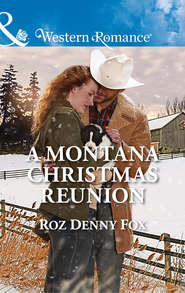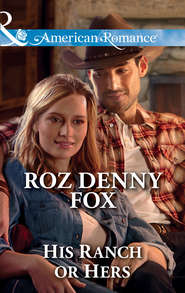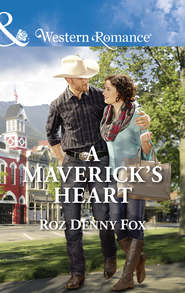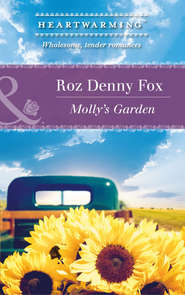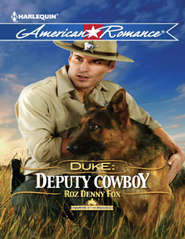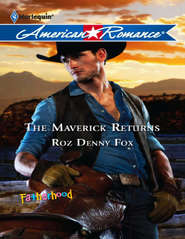По всем вопросам обращайтесь на: info@litportal.ru
(©) 2003-2024.
✖
An Unlikely Rancher
Автор
Год написания книги
2019
Настройки чтения
Размер шрифта
Высота строк
Поля
Jenna worried about how clingy she’d become since the funeral. “Tell you what. I need to phone Auntie Melody to let her know we arrived. Would you like to talk to her a minute?”
“No, it’s okay.” Andee wrapped her arms tightly around her much-loved bear and trailed her mother into her bedroom.
Jenna made her bed, then sat on it and punched her sister’s speed-dial number on her cell phone. She kept the call brief, putting a rosy spin on everything. She might have broken down if she’d heard the hint of an “I told you so.”
“Our next step,” she told Andee after ending the call, “is lining kitchen cabinets with the pretty contact paper I brought. Do you want to help peel the backing off after I measure and cut?”
“I guess so. Can we eat first? I’m hungry.”
“Sure. I’ll fix cheese sandwiches from stuff in the cooler and slice an apple for dessert. Tomorrow we’ll find a store and shop to fill our refrigerator.”
“Mommy, why isn’t our house near other houses like where we used to live?”
“This is a ranch and we need more land to raise birds as big as the ostriches.”
“Where are houses with other kids?”
That question stopped Jenna. She cleared her throat. “Soon we’ll hunt up the school where you’ll go in September. And I saw a park on the map the Realtor gave me. I’ll bet kids play there.”
That seemed to satisfy Andee, but it made Jenna wonder why she hadn’t given more thought to how isolated they’d actually be living here.
No, we’ll be fine. Pioneer women survived in much more isolated conditions.
They ate a light lunch, then lined the cupboards, a chore that took most of the afternoon. “Andee,” Jenna said as she pressed down the last piece of contact paper, “I need to look over Mr. Martin’s notes on how to care for ostriches. While I do that, why don’t you color?”
The girl ran to her room and came straight back with two picture books.
Jenna understood that Andee didn’t want to be out of her sight given that she’d left the child with her grandparents for a week after the funeral while she’d visited the ostrich farm in Georgia.
A farm, she might add, that looked much more prosperous than this one.
Then they’d moved in with Rob and Melody, and Jenna had hoped things would settle.
Stifling a sigh, she opened the envelope and started to read.
There were instructions about gathering eggs every other day and choosing some to put in incubators for hatching, similar instructions to those she’d gotten from the Georgia couple. She knew that eggs not sold to a wholesaler stayed in the incubators for forty-two days.
It seemed straightforward. It was as she’d told Melody: raising ostriches wasn’t difficult.
Oscar Martin apparently had derived income from four markets: the sale of eggs, feathers, meat and leather. The last two involved aspects of the business that didn’t appeal to Jenna. But it looked as if the manager was used to handling the meat and leather production for Martin. And it didn’t seem as if the man’s salary would break the budget Jenna had set up for herself.
“Before the sun sets, Andee, I want to inspect the pens, the hatchery and get a closer look at our ostriches. Would you like to come along?”
Nodding, the child closed her book, slid off the kitchen chair, picked up her bear and then reached for her mom’s hand.
“Oh, nice,” Jenna said as they left the porch. “There’s a slight breeze. It’s still hot, but that gives us some relief.”
“Ostriches are funny-looking,” Andee announced. “But they have pretty eyes,” she added, stopping to stare at the three birds that had ventured close to the fence. “They kinda look like Big Bird.”
“They do at that. Look at their long eyelashes.” Jenna pointed to one peering at them over the fence. “Each adult eats about three pounds of food a day,” she said, consulting the notes she’d brought with her.
“What do they eat?” Andee asked. She shifted her stuffed bear.
“Um, mostly grass. I suppose that’s why it’s much greener in the pens than in the yard around the house. We’ll be sowing grass seed in the empty pens, which explains why there are so many empty ones. When the grass comes up, we’ll move the birds and reseed the pen they were in.”
Jenna opened the door to one of several sheds that were really small barns. “Good, these bins are labeled. I see the grass is supplemented with alfalfa and corn that has vitamins mixed in it.”
“What’s supple...supple... What you said?”
“Supplement means ‘added to.’ Like we eat salad with our meat and potatoes. And I give you chewable vitamins as a supplement.” They left the shed and turned to the next page of notes. “The man who owned these birds said they do best living outside in the fresh air. But they need exercise. Each pen is big so they can run around.”
Andee ventured closer to the pen of milling birds. “I like being outside, too. Maybe I can play with them, Mommy.”
“Well, we will have to see about that. Perhaps you can pet some of the babies. I saw eggs under the lights in the incubators, but it doesn’t look like we have any smaller than some juniors in that pen farthest from the house.”
As she finished speaking, a small plane rose out of the direction where the earlier plane had disappeared. This one climbed higher and didn’t fly directly over them. Even so, she knew the noise of an engine winding up could put some of the birds in a flap.
Jenna watched the plane until it became a speck in the distance. The Georgia couple had told her that ostriches were excitable. And Martin, too, had indicated in his notes that being overwrought could lead to disrupted egg production.
Like it or not, Jenna decided, first thing tomorrow she needed to locate where the planes were based and register a complaint.
* * *
THE NEXT MORNING, electing to breakfast at the café she’d seen in town, Jenna gave the waitress their orders for pancake combos and then casually added, “We’re new to the area. Yesterday I saw a couple of small planes in the air, but I don’t see an airport on the map my Realtor gave me.”
The waitress paused. “Airport? There’s none closer than El Paso. Oh, wait. I almost forgot, one of our hometown boys recently moved back and has reopened a defunct private airpark about twenty minutes out of town.” She popped her gum and stabbed a finger in the direction of Jenna’s ranch.
Later, after their breakfast was paid for, Jenna managed to extract from her the name of the road to the airpark. They buckled in and set off.
The road to the airpark was gravel and littered with potholes. After she hit a particularly bone-jarring dip, she muttered a prayer that she wouldn’t blow a tire or break an axle on the Cherokee.
Her sister had been right about that, too. Her old car wouldn’t have survived this treacherous drive.
At last she topped a small rise and looked down on a weather-beaten facility. Definitely the airpark, because runways marked by reflectors fanned out from the opening of a low-slung multiplane hangar.
Slowing, Jenna saw a plane parked outside what might be an office. She braked when she caught sight of a man standing on a ladder, his head buried inside the open airplane engine.
Setting her emergency brake, she fought an unexpected kick to her stomach. It shook her to see the lean man in an olive-drab military jumpsuit, the type Andrew and his fellow flyers wore.
She fumbled with the key as she shut off the motor, grappling with her feelings.
Andee unfastened herself, threw open the back door and raced toward the ladder yelling, “Daddy! Daddy! Daddy!”
“No, no, sweetheart.” Scrambling out, Jenna registered the shock on the mechanic’s face as he straightened, dropped a tool and nearly toppled off his tall perch.
Jenna caught up with Andee just short of the ladder. She dropped to her knees, arms encircling her daughter even as her heart spiraled.
The blond stranger’s short-cropped, trying-to-curl hair didn’t resemble Andrew’s dark buzz cut. But he had those clear blue eyes—flyer’s eyes. Eyes the exact shade of a perfect sky for flying. It was the attribute that had first attracted Jenna to Andrew.






